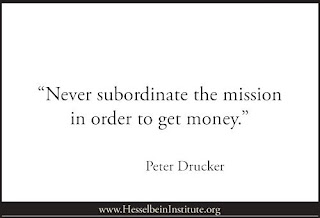In their bestselling book, The ONE Thing: The Surprisingly Simple Truth Behind Extraordinary Results, Gary Keller and Jay Papasan have a question that could change your board’s effectiveness—immediately. They ask:
"What's the ONE Thing
you can do this week such that by doing it
everything else would be easier or unnecessary?"
In my last blog, I listed statements from 13 leadership gurus about “The Leader’s ONE Thing”—and noted that 13 different ideas can’t all be right.
So today, we’re simplifying the question: “What’s your board’s ONE thing at your next meeting?”
If I were a guest at your next board meeting, I’d create four teams and send them to four flip charts in the four corners of the boardroom with one simple assignment: answer the ONE thing question. You’d have 18 minutes for prayer, discernment and agreement—and three minutes for each group to report back. (I’d also ask three people to give mini-reviews of this powerful book.)
QUESTION: “What's the ONE Thing you can do in this meeting such that by doing it everything else would be easier or unnecessary?"
The answers, I’m guessing, would cover the waterfront:
• “Schedule a day of prayer to discern God’s voice on the XYZ Initiative.”
• “Rather than continuing to committee-the-project-to-death, meet again in two weeks and let’s finalize the Board Policies Manual—so all of our policies are in one place and we can easily edit/adjust our policies at every future board meeting.”
• “In the next seven days, let’s commit to the online board self-assessment process that our board coach asked us to do a year ago!”
• “Finally, finally agree on criteria for future board members—and begin the process of ‘dating a board prospect’ before inviting anyone onto the board.”
• “Let’s get serious about a rolling three-year strategic plan that moves us from surviving to thriving—and agreeing on the board’s role in this process.”
Most boards will have different “ONE thing” recommendations—because all boards (and board cultures) are unique. A one-size solution doesn’t fit all. That’s why you must ask the question at every board meeting.
The authors suggest that one of the four thieves of productivity is the “inability to say ‘no’.” Keller writes, “Someone once told me that one ‘yes’ must be defended over time by 1,000 ‘no’s’.”
Great boards know the importance of the ONE thing and saying “no” is foundational to the ONE thing. You must say “no” to:
• limping along without written policies
• bringing new members onto the board without appropriate due diligence
• stewarding a Christ-centered ministry without Christ-centered board practices
• assessing CEO performance without self-assessing the board’s performance.
Add your list here!
QUESTION: So…“What’s your board’s ONE Thing?”



